
Sponsored Ads
|
» Home
» About us » Joza Vrljicak writing about Croatian Government Advisory Council for Croats Abroad
» Home
» Croatians in B&H » Joza Vrljicak writing about Croatian Government Advisory Council for Croats Abroad
» Home
» People » Joza Vrljicak writing about Croatian Government Advisory Council for Croats Abroad
» Home
» Friends In Action » Joza Vrljicak writing about Croatian Government Advisory Council for Croats Abroad
» Home
» Events » Joza Vrljicak writing about Croatian Government Advisory Council for Croats Abroad
» Home
» Education » Joza Vrljicak writing about Croatian Government Advisory Council for Croats Abroad
» Home
» Croatian Life Stories » Joza Vrljicak writing about Croatian Government Advisory Council for Croats Abroad
» Home
» Community » Joza Vrljicak writing about Croatian Government Advisory Council for Croats Abroad
| Joza Vrljicak writing about Croatian Government Advisory Council for Croats Abroad |
| By Joza Vrljičak |
Published
01/19/2014
|
About us , Croatians in B&H , People , Friends In Action , Events , Education , Croatian Life Stories , Community
|
Unrated
|
|
|
|
Established by Croatian law in 2012 and consisting of 55 representatives from around the globe
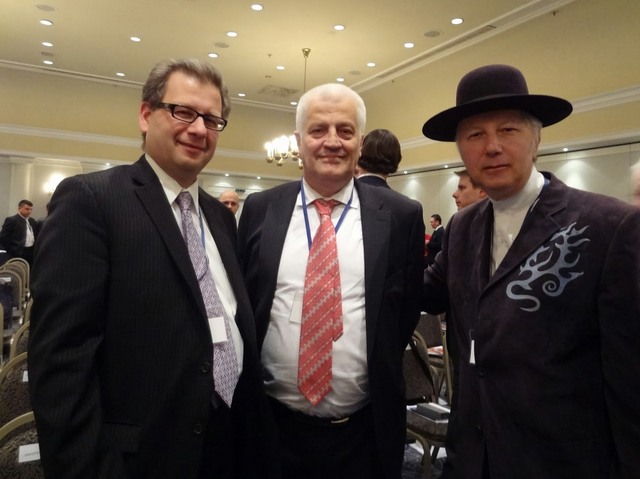 Joza Vrljičak in the middle, Croatian representative from Argentina, with John Peter Kraljic (left) and Nenad N. Bach (right), Croatian representatives from the USA. 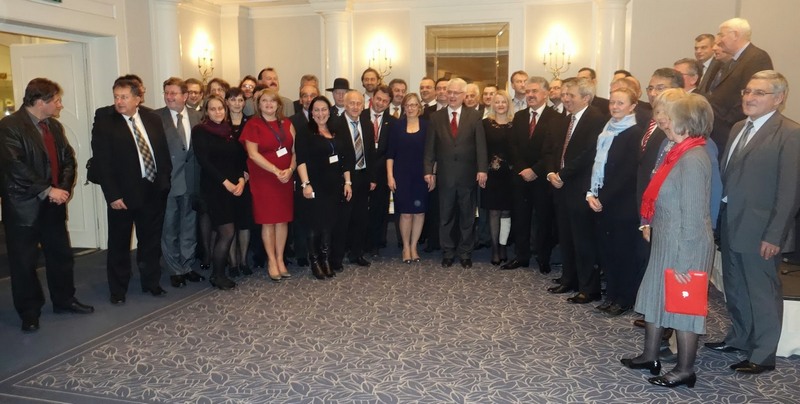 Meeting of the members of the Council with Mr. Ivo Josipović, president of the Republic of Croatia 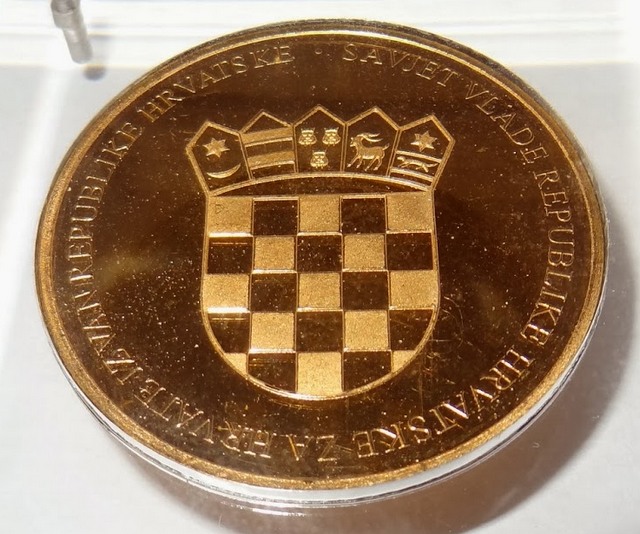
Advisory Council for Croats Abroad - Report on its First Meeting
CROATIAN GOVERNMENT ADVISORY COUNCIL FOR CROATS ABROAD – REPORT ON ITS FIRST MEETING
1. I returned recently from Europe where I participated in the First Meeting of the Advisory Council to the Government of the Republic of Croatia for Croats Living Abroad, which was held in Zagreb.
2. The Council was established by law in 2012 and it is formed by representatives of Croatians from around the globe.
3. We are 55 members proposed by Croatian communities in the different countries and nominated by the Government.
4. In the case of Argentina we are two members, that were elected in November 2012 by all the Croatian Associations and Groups in Argentina (more than 45).
5. There were 17 candidates and the most voted were magister Joza Vrljicak, editor-in-chief of the journal Studia Croatica and Mrs. Vjera Bulat Petrosic, president of the charity Caritas Croata Cardenal Stepinac.
6. They are Vice-president and President respectively of the Union of Croatian Associations in Argentina – Međudruštveni Odbor Hrvatskih Udruga i Ustanova u Argentini.
7. The other members of the Council for Latin America are Marco Buzolic B. (from Antofagasta) and Franco Ferrera Cvitanovic (from Santiago, who could not come to the Zagreb meeting) for Chile, Dubravka Sidonija Suto (from Sao Paulo) for Brazil, and Robert Jakubek (from Santa Cruz de la Sierra) for Bolivia, Paraguay, Uruguay, Peru, Ecuador and Venezuela.
8. Besides the 55 designated members representing the Croatians from all over the world, participated at the Meeting members by their positions (ex officio) representing the Academy, the Croatian Pastoral for Croatians Abroad, several ministeries, the National and University Library and several institutions that have to do with Croatian living abroad such as the Croatian Heritage Foundation (HMI) and the Institute for Migration and Ethnicity. And of course present at the Meeting were officials of the State Office for Croatians Abroad.
9. The Meeting took place in Zagreb on the 18 to 20th December 2013.
10. Wednesday the 18th started our activity with a visit to the Prime Minister of Croatia, Zoran Milanovic at his residence, in the Old Town (Gornji Grad).
11. Afterward we went to the Parliament of Croatia building –the Sabor, where we were received by his President, Josip Leko. There, a dinner was served.
12. On Thursday the activity started with the registration of the participants and then followed the Meeting itself.
13. Firstly addressed the Meeting the Director of the State Office for Croatian abroad, mr.sc. Daria Krsticevic.
14. In the second place spoke Mrs. Vjera Bulat Petrosic, who was presiding the session until the election of the President of the Advisory Council. Mrs. Bulat presided as the eldest member of the Council.
15. The next item on the agenda was the election of the President and the four Vice-presidents. The Law considers four groupings of Croatians outside the Republic of Croatia, namely: Croatians in Bosnia-Herzegovina, Croatian Minorities in countries near Croatia (some of these minorities have more than 500 years in these countries), the third grouping are the Croatians who live in Europe (recent migrations) and, finally, the Transoceanic Croatians), including those living in North and South America, South Africa, Australia and New Zealand.
16. For the position of President, two candidates were presented, one for Bosnia-Herzegovina (dr. Nevenko Herceg, professor and directive of the University of Mostar) and the well known musician and composer Nenad Bach, who lives in New York.
17. For the positions of Vice-presidents there were several candidates for the four grouping.
18. For the Transocean Croatian, the two most voted candidates in the first round were John Peter Kraljic (from New York) and Jose Maria –Joza- Vrljicak, from Buenos Aires.
19. Finally, after all the candidates addressed the Meeting to present themselves and to expose their ideas and proposals, the final voting took place, resulting in the following persons being elected:
- Nevenko Herceg (from Bosnia-Herzegovina), President of the Advisory Council.
- Ilija Nakic, Vice-President for the Bosnia-Herzegovina Croatians
- Tomislav Zigmanov (from Subotica, Vojvodina) for the Croatian Minorities
- Luka Krilic (from Rome, Italy) for the Croatians of Europe
- John Peter Kraljic (from New York) for the Transocean Croatians.
20. It become clear to everybody that the Croatians of Latin America and the ones in Australia and New Zealand were under-represented at the Vice-Presidential level and the idea was put forward that these two regions should have a Vice-President each.
21. As this is not possible under the law as it is right now, a consensus was reached that there is going to be two informal Vice-Presidents, and a request should be put forward to the Sabor in order that the law be amended to have the two Vice-Presidents, one for Latin America and the other for AusNZ.
22. In Thursday evening we had a soiree with the presence of the president of the Republic, Ivo Josipovic. Firstly we assisted to a concert by the Tamburitzas Orchestra of the HRT – Radio Television of Croatia. After that, a gala dinner was served.
23. On Friday the 20th, the plenary Meeting took place. It started with the introductory words by the President Nevenko Herceg. Afterwards we heard the report by the Director of the State Office for Croatians Living Abroad, reporting on the activities of the Office since its creation to date.
24. A project of declaration was approved while the Presidency (that if the President and the four Vice-Presidents) was entrusted with the task of writing the final version of the Declaration.
25. Also, the Presidency has to designate and confirm the 4 to 5 working committees which will work during the next months until the next Meeting, and which will use the new technologies for their work and communications.
26. As the final point of the programme, the elected members of the Presidency addressed the Meeting, as well as a number of members of the Advisory Council. For Latin America talked Joza Vrljicak and Robert Jakubek.
27. Joza Vrljicak mentioned, among other concepts, that the Croatians of Latin America are and feel far away, and that because three reasons:
- The physical distance. It is true that Australia and New Zealand are even farther, but the remoteness of South America is not small.
- The language. Most Croatians in Latin America don´t speak Croatian, neither do they speak English, thus they feel even farther.
- The economic situation. Many countries in Latin America do not enjoy good economic standings. Thus to travel to Croatia requires a much greater effort.
28. It is true that there is little we can do about this reality, but we want that the Croatians of the world know and understand these facts and situation.
29. In the presidential election won the idea that due to the endangered situation faced by the Croatian nation in Bosnia-Herzegovina, it would be better that the President be from Bosnia-Herzegovina.
30. Croatians all over the world understand the situation of Bosnia-Herzegovina Croatians, yet some were of the opinion that it would help more if the President was from some other region, for example the United States.
31. Anyhow, the elected President, Nevenko Herceg, in his address before the Council, stated several times that he will devote his efforts to all the Croatian in the world, not only the ones from Bosnia-Herzegovina.
32. He also expressed his position that two additional Vice-Presidencies should be created, one for the Croatians in Latin America and the other for the Croatians in AusNZ.
33. This need for a better representation for these two regions was expressed also by several members of the Council in their closing addresses.
34. In many of the public addresses as well as in informal conversations held these days the following points were expressed:
- The satisfaction and congratulations for the excellent work done by the State Office for Croatians Abroad, lead by her Director, Daria Krsticevic.
- We all have the felling that we were living an historic moment, since that was the first time that a body of that type met, representing Croatians from all over the world, invited by the Government of Croatia.
- That the most important achievement was the fact that we have met and known personally and that we are now in contact, and that we will continue working in favour of the Croatians around the world.
Joza Vrljicak, M.A.
Croatian Government Advisory Council for Croatians Abroad, Member
Source studiacroatica.blogspot.com.ar
| 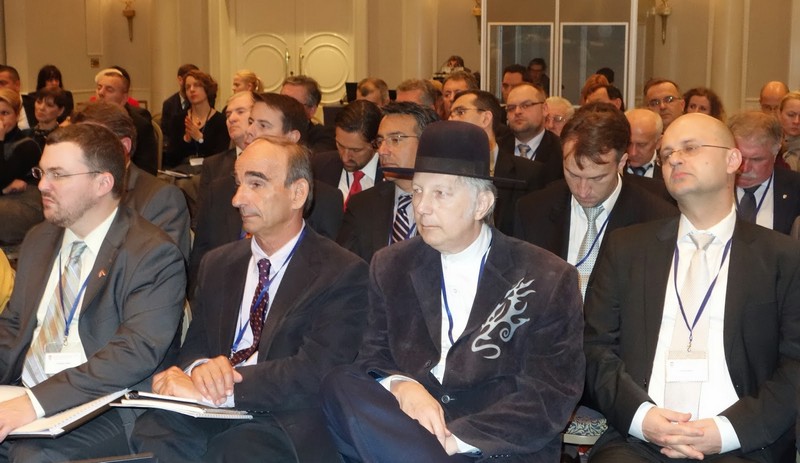 Meeting of the Council in Zagreb, discussing various issues of interest for Croatian emmigration throughout the world.
Old Croatian Coat of Arms above the main entrance to the building of the Croatian Deit in the city of Zareb. Croatian Deit, called Hrvatski SABOR, is one of the oldest in Europe.  Luka Krilić, John Peter Kraljić, Nevenko Herceg, Ilija Nakić and Tomislav Žigmanov Each member of the Council for Croats Abroad obtained a nice badge,
with his name encircled with an elegant circular old Croatian interlace pattern.
Članovi Savjeta predstavnika Hrvata iz Bosne i Hercegovine
- ILJO KOPIĆ
- ILIJA NAKIĆ
- BRANKO IVKOVIĆ
- JOSIP SUVALJ
- DRAGO BILANDŽIJA
- prof.dr.sc. NEVENKO HERCEG
- ZORAN TOMIĆ
- VLADO DŽOIĆ
- predstavnik Katoličke crkve za Bosnu i Hercegovinu prof. dr. preč. DARKO TOMAŠEVIĆ
Članovi Savjeta, predstavnci hrvatske manjine
- SLAVEN BAČIĆ, predstavnik za Srbiju
- PETAR KUNTIĆ, predstavnik za Srbiju
- TOMISLAV ŽIGMANOV, predstavnik za Srbiju
- GABRIELA NOVAK – KARALL, predstavnik za Austriju
- STANKO HORVATH, predstavnik za Austriju
- MIŠO HEPP, predstavnik za Mađarsku
- FRANJO PAJRIĆ, predstavnik za Mađarsku
- ĐANINO KUTNJAK, predstavnik za Sloveniju
- FILIP BOŽIĆ, predstavnik za Sloveniju
- JOSIP ROKO ĆOLAK, predstavnik za Bugarsku
- ANDRIJA VUKSANOVIĆ, predstavnik za Crnu Goru
- LENKA KOPRIVOVA, predstavnik za Češku
- ANTONELLA D' ANTUONO, predstavnik za Italiju
- SEBASTIJAN ČOLAKIĆ, predstavnik za Kosovo
- SNJEŽANA TROJAČANEC, predstavnik za Makedoniju
- PETAR HATEGAN, predstavnik za Rumunjsku
- RADOSLAV JANKOVIČ, predstavnik za Slovačku.
Članovi Savjeta, predstavnici hrvatskog iseljeništva / dijaspore
- NENAD BACH, predstavnik za Sjedinjene Američke Države
- JOHN PETER KRALJIĆ, predstavnik za Sjedinjene Američke Države
- IVAN TOMIĆ, predstavnik za Sjedinjene Američke Države
- ZVONKO LABAS, predstavnik za Sjedinjene Američke Države
- NIKO HAZDOVAC, predstavnik za Sjedinjene Američke Države
- STJEPAN ASIĆ, predstavnik za Australiju
- MLADEN LEKO, predstavnik za Australiju
- LUKA BUDAK, predstavnik za Australiju
- ZVONIMIR ANIČIĆ, predstavnik za Kanadu
- IVAN TOMISLAV GRBEŠIĆ, predstavnik za Kanadu
- CAROLINE SPIVAK, predstavnik za Kanadu
- MONIKA ADŽAMIĆ, predstavnik za Saveznu Republiku Njemačku
- MIJO MARIĆ, predstavnik za Saveznu Republiku Njemačku
- IVICA ORLOVIĆ, predstavnik za Saveznu Republiku NjemaČku
- JOSE MARIA VRLJIČAK, predstavnik za Argentinu
- VJERA BULAT PETROŠIĆ, predstavnik za Argentinu
- MARCO BUZOLIĆ BUZOLIĆ, predstavnik za Čile
- FRANCO FERRERA CVITANOVIĆ, predstavnik za Čile
- MIROSLAV PIPLICA, predstavnik za Austriju
- DUBRAVKA SIDONIJA ŠUTO, predstavnik za Brazil
- YVAN CINDRIĆ, predstavnik za Francusku
- LUKA KRILIĆ, predstavnik za Italiju
- DANIJELA TASOVAC, predstavnik za Južnoafričku Republiku
- LEO PENZIĆ, predstavnik za Novi Zeland
- JOSIP ZORICA, predstavnik za Švedsku
- ŠIMUN ŠITO ĆORIĆ, predstavnik za Švicarsku
- MIRA MALOVIĆ - YEELES, predstavnik za Ujedinjeno Kraljevstvo
- 2EDITA LEŠ LOTHE, predstavnik za Belgiju, Dansku, Luksemburg, Nizozemsku i Norvešku
- ROBERT JAKUBEK, predstavnik za Boliviju, Ekvador, Paragvaj, Peru, Urugvaj i Venezuelu.
www.hrvatiizvanrh.hr
| 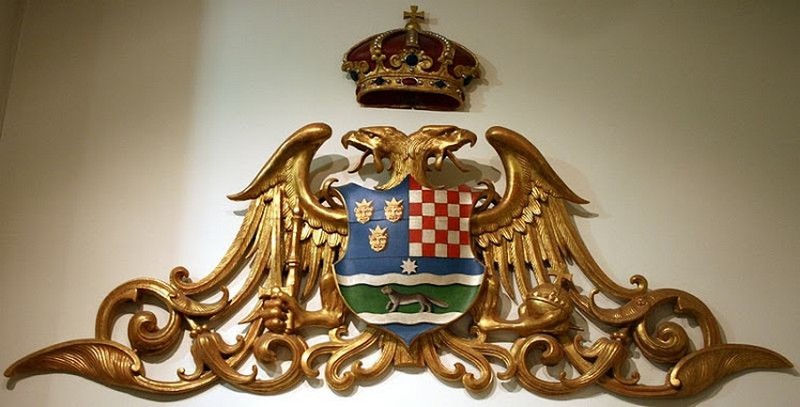 Croatian Coat of Arms from the 19th century, kept in the Museum of the City of Zagreb. It represents the United Kingdom of Dalmatia, Croatia and Slavonia (Trojedna Kraljevina Dalmacija, Hrvatska i Slavonija): three leopard heads on the left represent Dalmatia, to its right is the coat of arms of Croatia, and below is the coat of arms of Slavonia, with kuna (marten) on the green surface. The KUNA (i.e., HRK = Hrvatska kuna = Croatian Kuna) is the official Croatian currency, the name of which was inspired by the usage of marten's skin for paying since the 12th century. The small star, visible in the middle, represents the city of Zagreb. Zlatni rat (i.e., Golden Cape), the most beautiful cape in the world, on the island of Brač, Croatia, early in the morning. Note a parachutist flying to the beach. 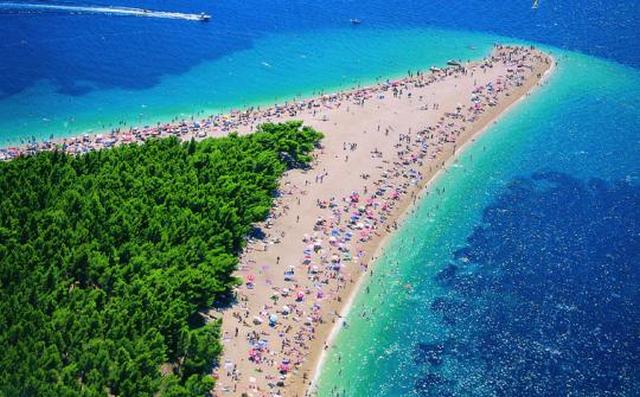 Zlatni rat in the afternoon. Note that the vertex of the cape is movable, depending on underwater streams.
Welcome to the web site of State office for Croats Abroad
Almost four million Croats live outside the Republic of Croatia. It is a huge and invaluable potential in human and economic terms.
The adoption of the Act which provides the strengthening of mutual economic, cultural, scientific, educational, sporting and other links, and the establishing of the State Office for Croats Abroad sent a clear and definite message to all of you living outside the borders of our beautiful Homeland: We want to strengthen our unity, to build our cooperation on the principles of mutual trust and respect and to create partnerships based on institutional foundations.
This is a tremendous step forward. Twenty years upon the gaining of Croatian independence the basic legal and institutional prerequisites are introduced in order to build the systematic and efficient cooperation where legal care for Croats abroad becomes a necessary part of internal and foreign policy, and the strategic objective is presented through the preservation, strengthening and development of the Croatian unity, as well as the economic and overall progress that includes Croats in the native land and Croats living in other countries. Given the fact that there are various situations of Croatian communities in the world expressing different needs and possibilities, the State Office for Croats Abroad, as the central government body for relations with Croats outside Croatia, will adjust its approach accordingly to each and every Croatian community with respect to their specific conditions. Furthermore, our intention is to strengthen Croatian communities abroad and their position and role in the societies where they live and work, and to provide conditions for their inclusion in the social and political life of the Republic of Croatia.
I honestly believe that your additional support, your sincere engagement, motions and suggestions, even the well-intentioned criticisms will give a crucial contribution in achieving these set goals. Therefore I will use this opportunity to invite you once again for joining in constructive cooperation.
The State Office for Croats Abroad will be the first address for all your needs, for all the good quality ideas and initiatives; we will give the strong support to all efforts which contribute to broad connections among Croatian people and will be the solid link and the bridge between the Republic of Croatia and you who live outside its borders.
MSc. Daria Krstičević, Head of Office
Source www.hrvatiizvanrh.hr
Contact
State Office for Croats abroad
Trg hrvatskih velikana 6
10000 Zagreb
T: +385 (1) 6444 680
F: +385 (1) 6444 688
E: press@hrvatiizvanrh.hr
E: ured@hrvatiizvanrh.hr
Working time:
Monday to Friday
8:30 to 16:30 pm
Working hours:
to work with clients:
Monday to Friday
9:00 to 15:00 pm
|
Status of Croatian immigrants and their descendants abroad
According to the census taken in April 2001 there were 4. 437, 460 inhabitants in Croatia.
Based on the estimates and assessments of Croatian diplomatic missions and consular offices, Croatian Catholic missions, as well as the censuses taken in the countries where Croat immigrants and their descendants reside, and also based on the estimates of Croatian communities in some of those countries, it is estimated that there are about 3,000,000 Croatian immigrants and their descendants living outside Croatia and worldwide.
Based on the assessments by individual countries around the world, the number of Croats and their descendants is as follows:
Argentina: about 250 000
Australia: around 250,000
Austria: around 90,000
Belgium: 6 000
Brazil: around 20 000
Bolivia: 5 000
Chile: 200 000
Denmark: approximately 1 000
Ecuador: about 4000
France: 40 000
Italy: about 60,000
South Africa: around 8000
Canada: about 250 000
Luxembourg: about 2000
Netherlands: 10 000
Norway: about 2000
New Zealand: 40 000
Germany: about 350 000
Paraguay: 5 000
Peru: around 6000
United States, about 1.2 million
Sweden: approximately 35 000
Switzerland: 80 000
Uruguay: 5 000
Great Britain: around 5000
Venezuela: 5 000
Source www.hrvatiizvanrh.hr
| Formated for CROWN by Darko Žubrinić
Distributed by www.Croatia.org . This message is intended for Croatian Associations/Institutions and their Friends in Croatia and in the World. The opinions/articles expressed on this list do not reflect personal opinions of the moderator. If the reader of this message is not the intended recipient, please delete or destroy all copies of this communication and please, let us know! |
Related Articles
Related Links
Comments
-
Comment #1
(Posted by Zeljko)
Thank you Nenad and Joza!
We know what the advisory council is, and who is on it - but we still do not know what the organization is doing. What are the organizational goals for 2014? I have not seen anything about this anywhere.
Here is an interesting commentary on the advisory council by Ina Vukic
Croatia: Harnessing The Wealth Of Diaspora
http://inavukic.com/2014/01/18/croatia-harnessing-the-wealth-of-diaspora/
Submit Comment
|
|